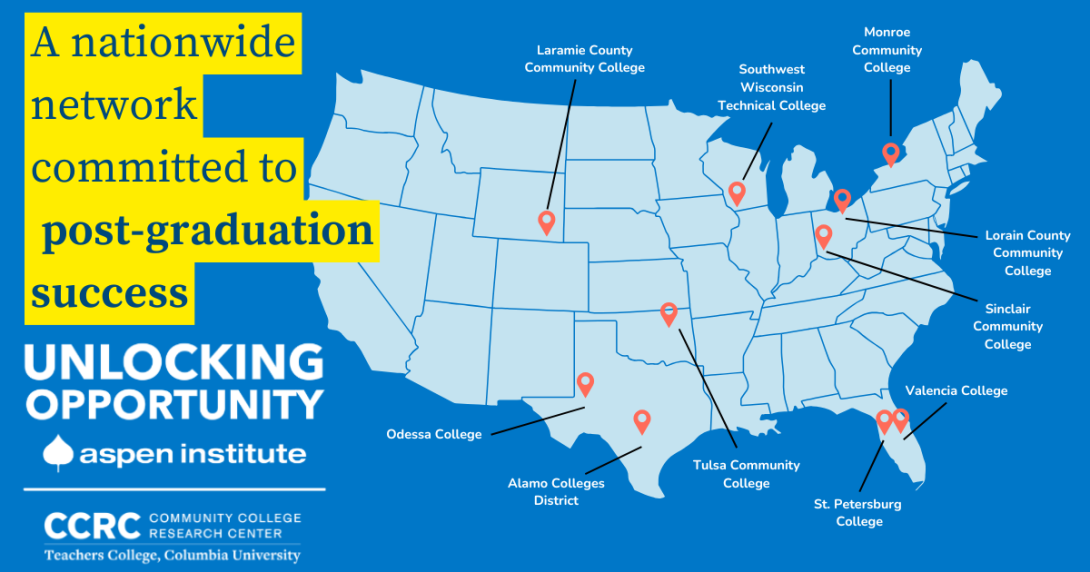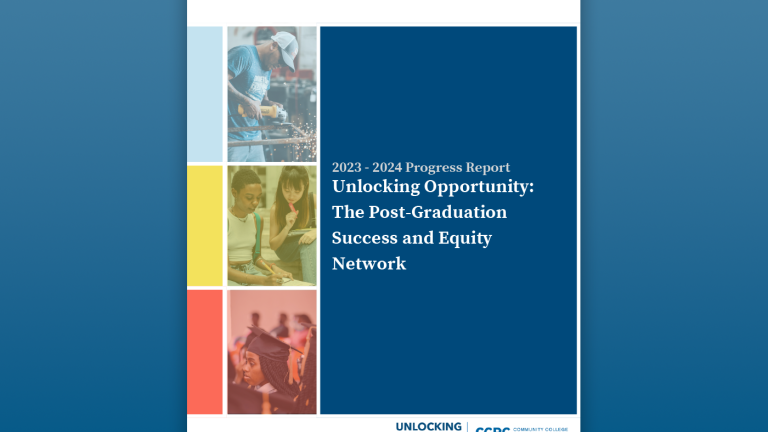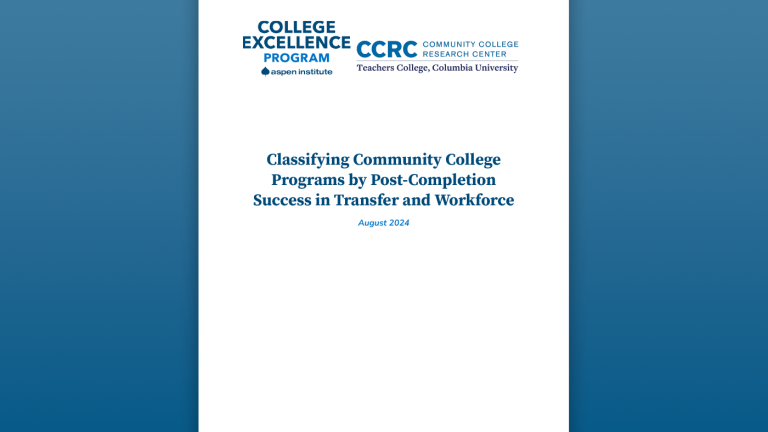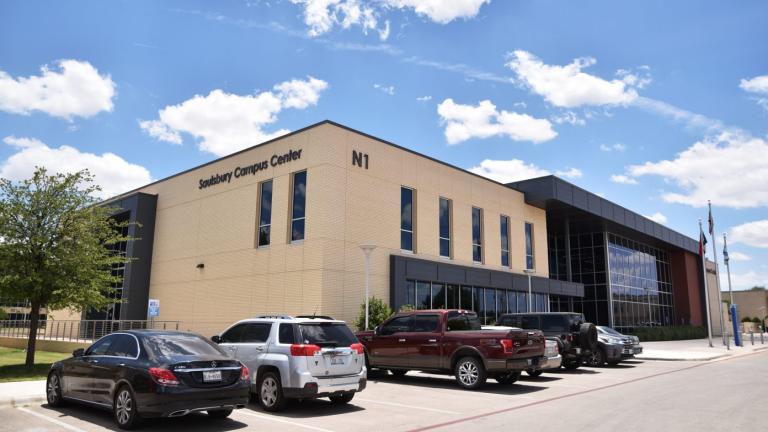Unlocking Opportunity
Unlocking Opportunity is a project that intensively engages community college leaders and teams over multiple years to develop and enact bold reforms focused on increasing the number of students, including students of color and those from lower-income backgrounds, entering and completing high-value community college programs. The project's central goal is to ensure that more students complete programs that lead directly to jobs that pay a sustaining wage or to transfer and completion of a bachelor’s degree.
Introduction
The Aspen Institute College Excellence Program (Aspen) and its partners at the Community College Research Center (CCRC) are engaged in a first-of-its-kind initiative that reflects the next wave of the community college student success reforms: a focus on excellence and equity in post-completion outcomes. Colleges selected for the network work closely with Aspen, CCRC, expert coaches, and field experts over multiple years on comprehensive reforms with one overarching goal: substantially increasing the number of community college students, including students of color and those from lower-income backgrounds, entering and completing programs that lead directly to jobs that pay a sustaining wage or to completion of a bachelor’s degree.
The program engages college leaders and teams in:
- Assessing the relative value of their programs using the CCRC/Aspen program evaluation tool
- Setting quantitative goals for increasing students in high-value programs,
- Developing and implementing reform strategies designed to achieve quantitative goals
- Learning from research into colleges that have achieved the advising and program modification strategies that lead to stronger post-graduation success
- Receiving customized support, including coaching, site visits, and feedback reports with recommendations for advancing goals and strategies
The 10 colleges participating in the initial three-year cohort (2023-25) are:
- Alamo Colleges District with San Antonio College as a pilot college
- Laramie County Community College
- Lorain County Community College
- Monroe Community College
- Odessa College
- Sinclair College
- Southwest Wisconsin Technical College
- St. Petersburg College
- Tulsa Community College
- Valencia College
This project is made possible by support from: Arnold Ventures, Ascendium, Bank of America, ECMC Foundation, JPMorgan Chase & Co. and Strada Education Foundation.

Program Classification Tools from Unlocking Opportunity
This program classification guidebook and accompanying data analysis and visualization tools are available for community colleges seeking to (1) increase the number of students in high-value programs that lead directly to a well-paid job or to transfer and a bachelor’s degree and (2) decrease the number of students in lower-value pathways that are unlikely to prepare them for good jobs or further education at the bachelor’s level. These resources were developed by the Aspen Institute College Excellence Program (Aspen) and the Community College Research Center (CCRC) during their work with the ten Unlocking Opportunity network colleges, and are made possible thanks to generous support from Arnold Ventures, Ascendium Education Group, ECMC Foundation, and the Strada Education Foundation.
Classifying Community College Programs by Post-Completion Success in Transfer and Workforce is a guide that provides the conceptual framework and technical guidance for colleges to classify all their programs—and subsequently all enrollments and awards—into broad categories based on post-completion value.
The Enrollment Analysis Tool is a downloadable Excel-based tool that allows community colleges to enter their own program data, producing visualizations and analyses that enable college leaders to identify patterns and possible strategies to improve programs’ post-completion value and increase the number of students in high-value programs.
An Inquiry Guide on Classifying Community College Programs by Post-Completion Success in Transfer and Workforce accompanies the Enrollment Analysis Tool and further guides college leaders on what questions to consider as they review their data.
About the Project
While no single reform will be required of network members, each college—including its president and senior team—will commit to advancing reforms through five broad strategies:
1. Set a Family-Sustaining Wage Standard and Assess Programs Against It
Presidents and their senior teams will begin this work by deciding on and refining a “waterline,” the baseline wage standard the college aims to ensure graduates earn in its regional context, then assessing which current programs’ graduates are likely to be above the waterline.
2. Setting Goals for Changing Program-Level Enrollments and Outcomes
Presidents and senior teams will engage in an analytic, goal-setting process rooted in evaluations of student enrollments by program, including by race/ethnicity and income level. Teams will set overall and equity-based goals for reducing enrollments/completions in low-value programs and increasing enrollments in high-value programs—specifically, CTE programs aligned to family-sustaining wages or pre-transfer associate degree programs. CCRC and Aspen have worked with many college leaders to provide support for such analysis.
3. Strengthen the Program Portfolio and Partnerships to Increase Post-Graduation Success
Evidence from the field shows that fewer than half of all community college credentials result in strong post-graduation success. For some students, this is because the associate degrees they earn do not have strong labor market value; they never transfer and earn a bachelor’s degree. For others, the cause is the design of the terminal CTE programs in which they enroll—the credentials they earn do not result in a family-sustaining wage job. Participating colleges will aim to change both of those realities. They will work to better align transfer-oriented associate degree programs with what it takes to transfer all credits to a four-year university with junior year standing in a major, and align CTE programs with the expectations of employers that offer family-sustaining wage jobs. This may mean creating new programs, redesigning existing ones, or sunsetting some programs. These program reform efforts will be critical to increasing the proportion of students in high-return programs, including students of color and lower-income students. Colleges will also have an opportunity to strengthen partnerships with employers and universities. Using Aspen and CCRC’s Transfer Playbook and Aspen’s Workforce Playbook, colleges will craft strategies to improve how they work with key partners to deliver better and more equitable outcomes for graduates.
4. Align Advising to Greater and More Equitable Completion of High-Value Programs
Too many students begin their coursework with no clear pathway. They remain undecided for too long, weakening their motivation and causing them to accumulate too many credits that don’t contribute to either securing a good job right out of community college or attaining a bachelor’s degree that will afford them strong employment opportunities. Others make choices that are not aligned to their ultimate goals, failing to receive guidance that would help them pick degree programs and associated courses that lead to family-sustaining wage jobs and/or a highly structured pathways to a bachelor’s degree. Unlocking Opportunity will help colleges improve their advising systems so that more students make earlier and better program decisions and enroll in courses consistent with those decision—especially the students of color and lower-income students least likely to be in high-value programs.
5. Institutionalize Reforms
As Unlocking Opportunity colleges conduct student success reforms, they will also strengthen the systems that make scaling and sustaining reforms possible beyond the three-year project. Participating colleges will have an opportunity to evaluate and consider reforms in several key capacity areas, including senior team operations, program approval and review processes, strategic finance and resourcing strategies, and ensuring that data use is aligned to college-wide focus on reforms.

Funders
Partners
Contact Us
For more information please contact: Tess Henthorne, Senior Program Manager







